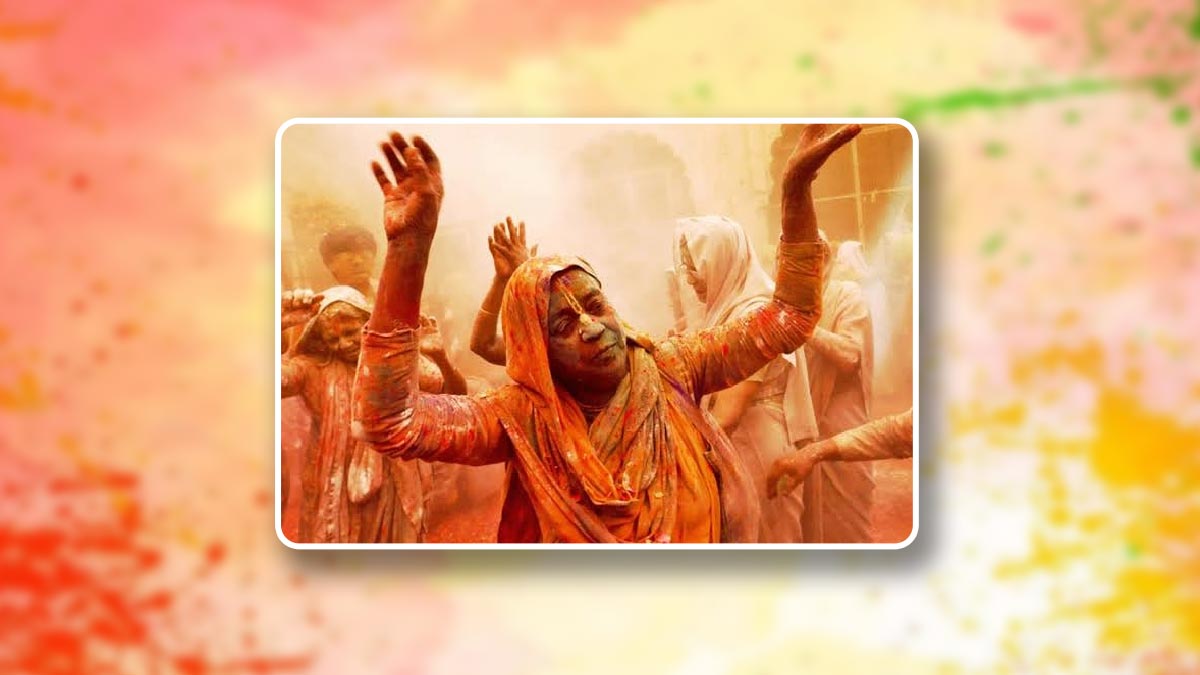
Holi, India’s vibrant festival of colours, love, and merriment, resonates deeply with rich mythological tales. Among the myriad celebrations across the nation, Vrindavan in Braj holds a special place. Encompassing Mathura, Vrindavan, and surrounding areas, Braj brims with historical significance.

Here, Lord Krishna, the playful Hindu deity, spent his childhood and performed the enchanting Raslila dance with Radha. Legend has it that Holi itself stemmed from a playful act by a young Krishna, concerned about his dark complexion compared to Radha’s. Following his mother’s suggestion, he playfully smeared colour on Radha and her friends, initiating a tradition that continues to this day.
However, for decades, Vrindavan also held a different story, one draped in white. Widows, ostracized by societal norms, found refuge in this temple town. Clad in white sarees, they faced isolation and hardship. Denied participation in festivities like Holi and Diwali, their lives lacked the vibrancy inherent to the land of Krishna. This narrative began to shift in 2012, thanks to the intervention of the Supreme Court and the dedicated efforts of Sulabh International, a non-governmental organisation.
Sulabh International, championing the cause of empowerment and social inclusion, embarked on a mission to transform the lives of Vrindavan’s widows, A key initiative was the introduction of a special Holi celebration for them at the Gopinath Temple. This wasn’t just about colours; it was about reclaiming joy, fostering social acceptance, and weaving it back into the vibrant tapestry of Vrindavan.(From Mathura To Barsana, Uttar Pradesh's Must-Visit Holi Destinations)

Don't Miss: Holi 2024: Date, Timing, History And Significance – A Comprehensive Guide
Before 2013, as reported by PTI, these windows could only participate in Holi by offering colours to “Thakurji” (Lord Krishna). The tradition of widows celebrating amongst themselves marked a turning point. The first such celebration saw a joyous eruption of colour and laughter. Widows, usually adorned in white, transformed into a kaleidoscope of reds and pinks, playfully smearing “Gulal” (From Gulal To Groove: Top Holi Songs For Your Instagram Reels Fiesta) (coloured powder) and showering each other with fragrant flower petals. The air resonated with devotional songs (bhajans) are sung in praise of Krishna, their voices a testament to newfound freedom and a celebration of life itself. Witnessing these women dance and revel in the midst of vibrant colours offered a powerful counterpoint to the monochrome existence they often endured.

Don't Miss: Holika Dahan 2024: Astrology Remedies To Get Rid Of All Your Troubles
Widow’s Holi isn’t just about festivities; it’s a symbol of societal change. It represents a shift in traditions, a dismantling of outdated norms that ostracized widows. This celebration signifies a more inclusive India, one where widows are no longer relegated to the fringes but are welcomed into the heart of the community. The vibrant colours of Holi become a metaphor for hope, a promise of a future where widows can reclaim their rightful place in society, not just during festivals, but every day.
Image Courtesy: X
Jagran New Media's gender and lifestyle vertical, catering to women of all age groups, helping them remain updated, on-trend, and aware. To improve our performance and understand our readers' interests better, we have created this poll. This will take two minutes of your time, do help us by clicking here.
For more such stories, stay tuned to HerZindagi.
Our aim is to provide accurate, safe and expert verified information through our articles and social media handles. The remedies, advice and tips mentioned here are for general information only. Please consult your expert before trying any kind of health, beauty, life hacks or astrology related tips. For any feedback or complaint, contact us at compliant_gro@jagrannewmedia.com.